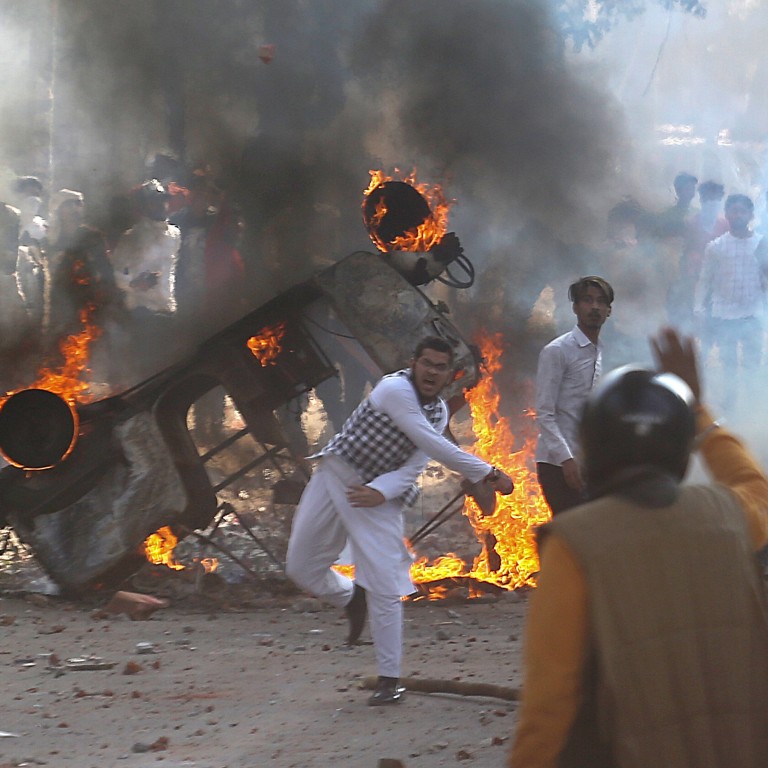
Analysis | What’s killing India’s democracy? It’s not just Modi who’s to blame
- As violence stoked by the BJP’s Hindu-centric rhetoric killed dozens in Delhi recently, opposition parties seemed content to roll over and play dead
- The country’s treatment of its Muslim minority has even drawn comparisons to China from US-based democracy watchdog Freedom House
A couple of hours later, two men brought Ansari back on a scooter. They had found him lying in a pool of blood with his head smashed in. He told them that he had been spotted by a marauding Hindu mob that asked him his name and set upon him when they learned he was a Muslim. With barely any public transport available amid the rioting, Salman laid his father on a handcart he found by the roadside and pushed it for several kilometres to the nearest clinic. The staff there gave Ansari first aid but had little else to offer, so Salman pushed the cart to another clinic further down the road, which asked for a deposit he could not afford. Finally, he found an auto rickshaw that agreed to take him to the government-run Guru Teg Bahadur Hospital but, by the time they arrived, Ansari had died.
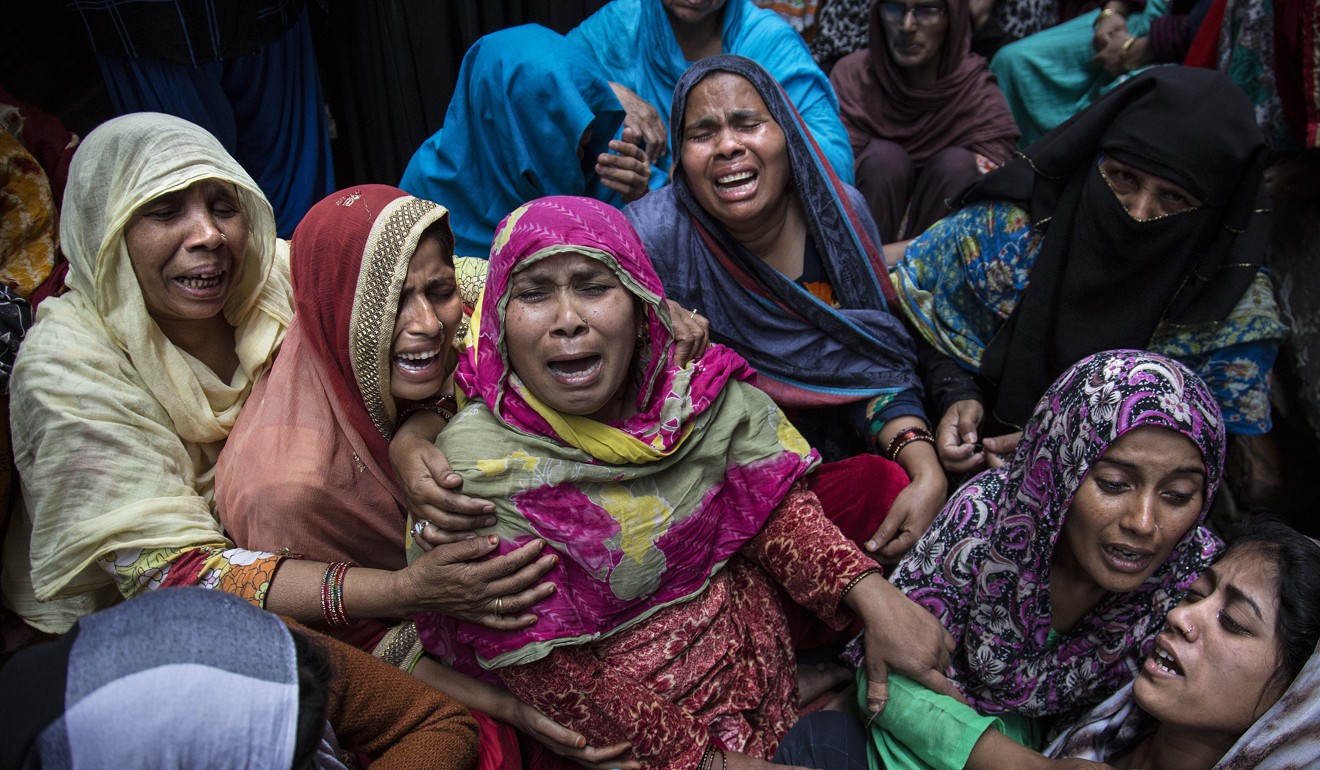
The hospital overflowed with patients as the violence outside raged for five days. Rickshaw puller Prem Singh’s family found him there the day after Ansari’s death. Singh had stepped out to buy milk for his three children and never returned. His was one of the unidentified bodies recovered from the roadside and placed at the mortuary. He was shot dead by a Muslim mob targeting Hindus in the area.
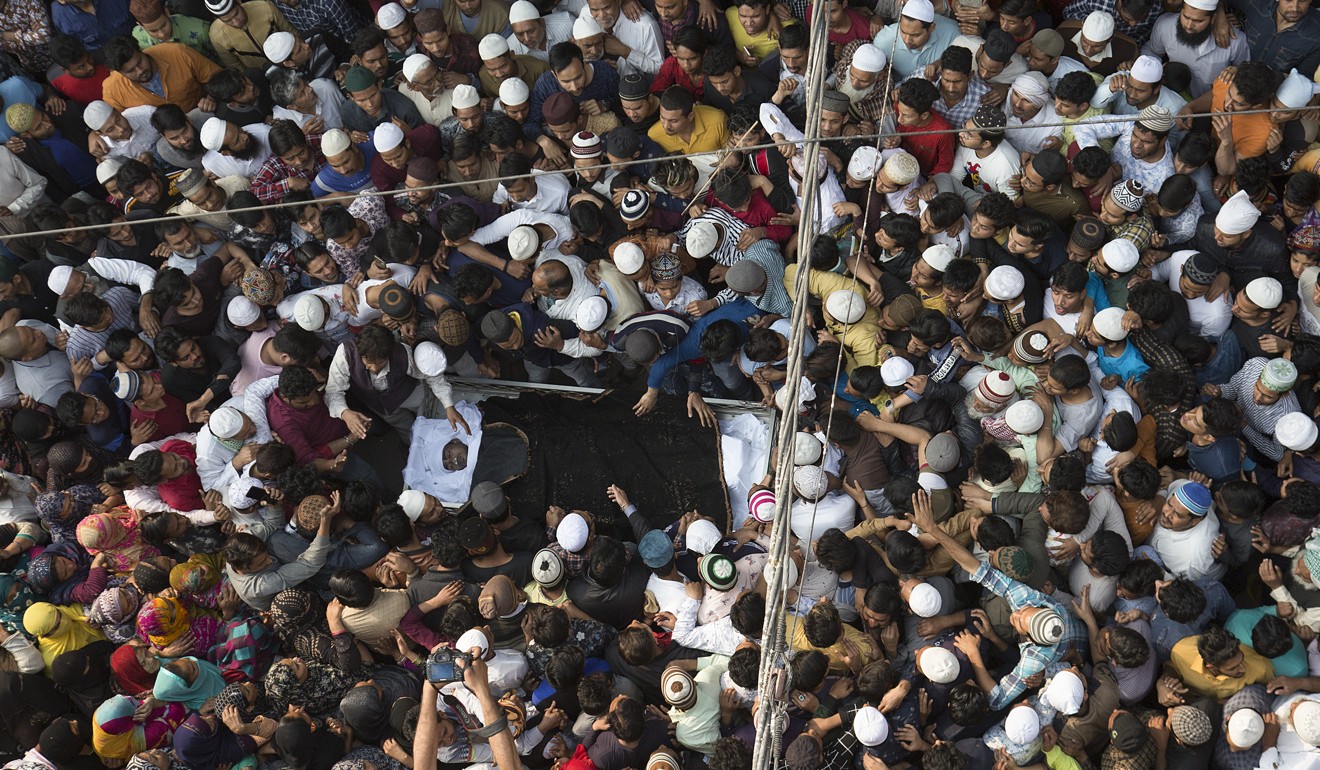
Last week, angry opposition leaders threw a fit in parliament, demanding a discussion of the violence. Enraged by the House Speaker’s decision to defer the discussion to after Holi, they balled up pieces of paper and threw them at him. That is what Indian parliamentarians do when they are angry. And when they are really angry, as they were this time, they also rush to the “Well of the House” – a space for secretarial staff near the Speaker which MPs occupy as a traditional form of registering protest.
In the resulting melee, opposition and ruling party members shoved each other, forcing the Speaker to convene an all-party meeting in which it was decided that no member of the opposition or the ruling side would rush to the opposing benches.
Had the opposition leaders been as agitated a couple of weeks earlier and ventured into the restive areas of the city with the same urgency, dozens of people might still be alive and thousands of families saved from destitution. Throughout the time Delhi burned, or in the days building up to the violence, none of them showed any interest in mobilising their cadres to organise peace marches or initiate other community interventions.
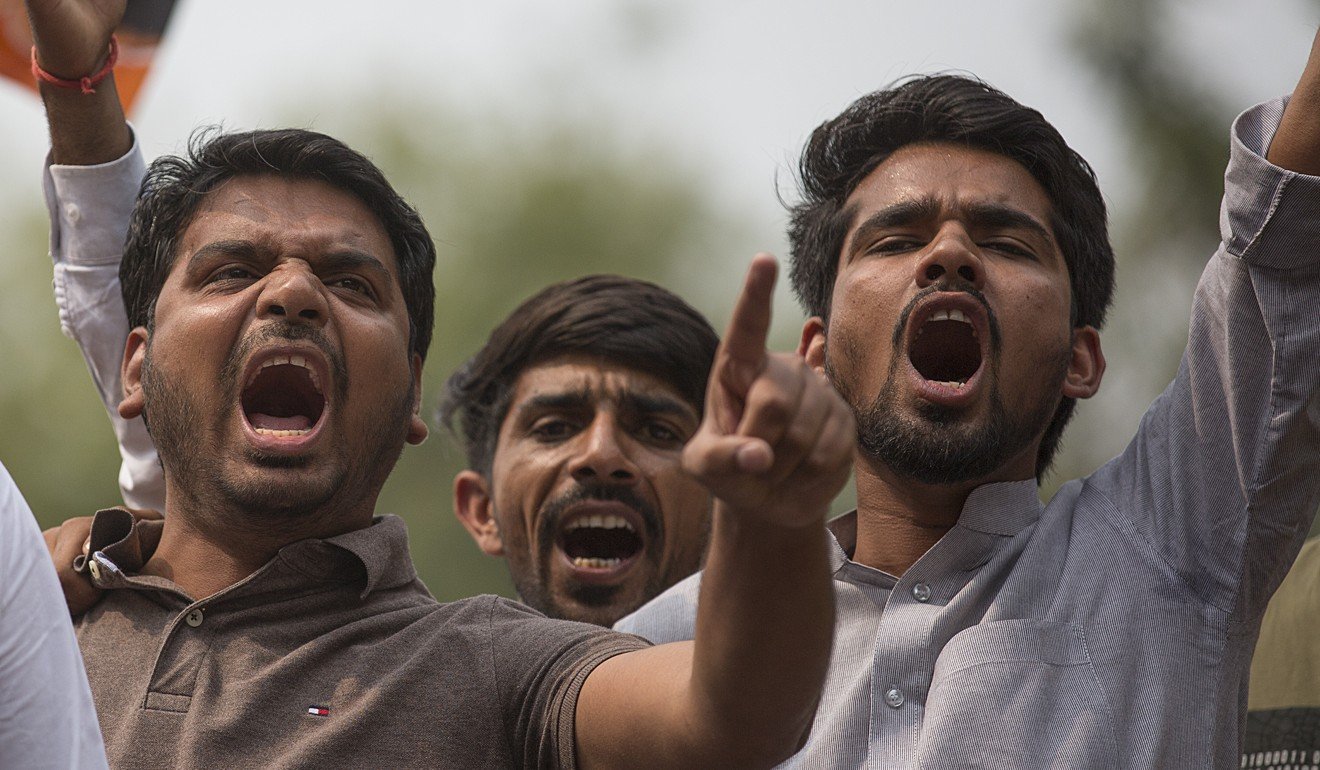
It is not that the clashes that erupted or the targeted violence that followed were a complete surprise. Modi’s Bharatiya Janata Party (BJP) has for some time been openly inciting its flock for a bloody showdown. Once the hotheads on both sides had been sufficiently warmed up, the final act would begin. And, it needed to begin soon, as the BJP’s crushing defeat in last month’s Delhi state election indicated that it was losing its Hindu majoritarian narrative to the recent spurt of secular protests against a new law seen as anti-Muslim.
Modi thinks he is Xi Jinping, but protests show India is not China
Considered by many as an affront to India’s secular constitution that does not discriminate on the basis of religion, the law has triggered rallies, marches and boycotts across the nation. Largely led by students, activists, intellectuals, artists, film personalities and the liberal middle class, the protests have been the first mass outpouring of popular rage against Modi’s government. One area in Delhi in particular, called Shaheen Bagh, where elderly Muslim women have led a peaceful sit-in since December, has become an iconic protest site. It has inspired copycat, non-violent demonstrations across the country, which triggered the violence in Delhi.
Senior BJP leaders have been openly urging followers to attack the protesters. “Shoot the traitors” has become a popular slogan for party workers, who like to see the protests as a purely Muslim phenomenon and hence deserving of a bloody reprisal. The BJP tried to whip up majoritarian anger against Muslim protesters in the recently concluded Delhi state elections but failed miserably, as the local Aam Aadmi Party (AAP) swept back to power with an overwhelming majority. Rather than accept the people’s verdict, a local BJP leader threatened protesters with violence if they did not end their sit-ins. That incendiary speech set the stage for the clashes between Hindu and Muslim mobs days later. What began as rioting by both sides soon descended into a pogrom of Muslims, as hordes of armed Hindu men brought in from outside Delhi went about targeting Muslim homes and businesses.
In the time-honoured tradition of Indian mass murders, such as Gujarat in 2002 and Delhi in 1984, the overwhelmingly Hindu police force remained inactive, either choosing to look away or ordered to stand down and allow the bloodletting by their political administrators. An uneasy peace is now returning as the Delhi police force, controlled by Modi’s federal government, has swung into action – even if it is late.
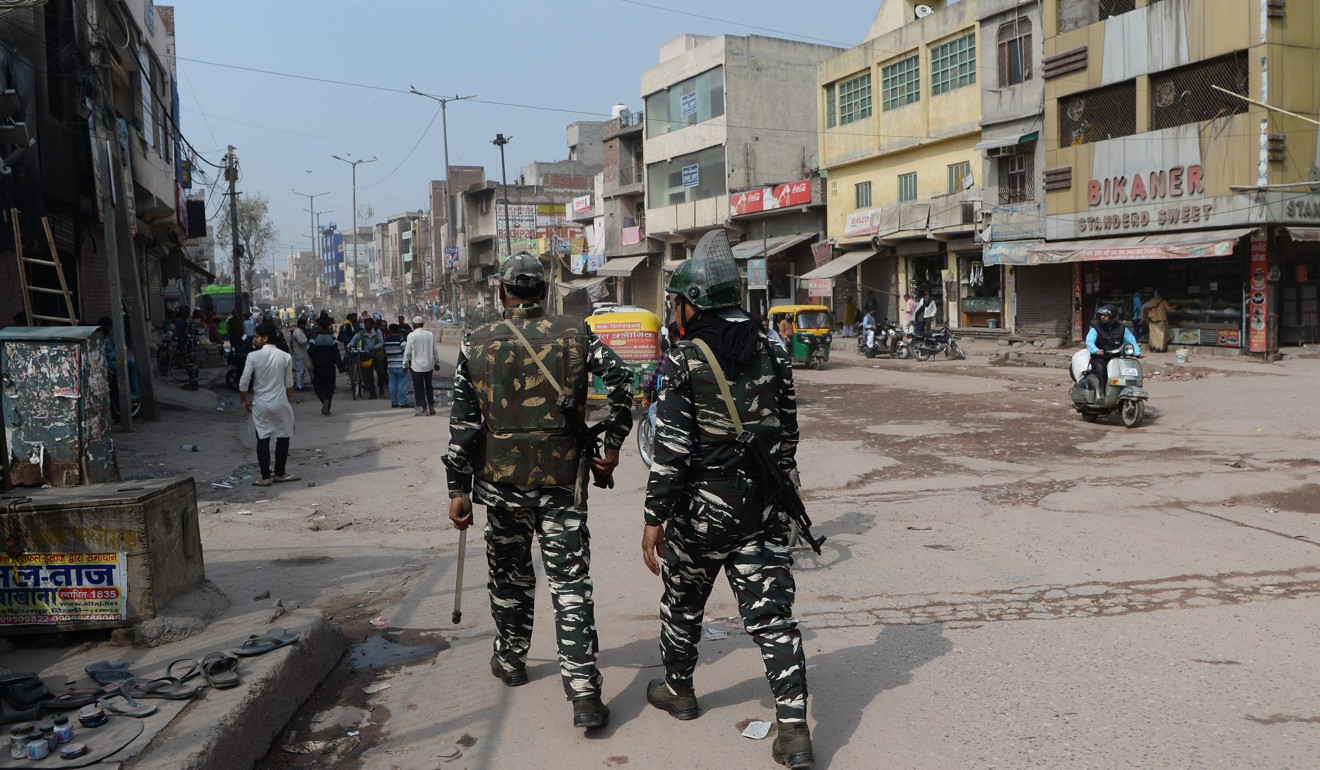
Delhi’s unique status as the nation’s capital allows for its police to be controlled by the federal government. All other state governments are in charge of their respective police forces. Delhi’s ruling AAP, which grew out of an anti-corruption movement in 2012, uses this as an excuse to feign helplessness in matters related to law and order, such as this one. Not long ago, it was thought of as an emerging national party. Its emphasis on basic services, such as health and education, is a refreshing contrast to the denominational politics of religion and caste that Indian parties often resort to. It was rewarded handsomely for its development agenda in the Delhi elections, but on the raging issue of the BJP’s Hindu-first thrust and the larger national debate over assaults on the secular character of the Indian state, the AAP has chosen the convenience of silence.
The AAP neither pressed its substantial cadres into action nor did it exhibit any urgency in ramping up the city’s medical services to help riot victims. It was a Delhi High Court judge, S. Muralidhar, who had to convene a midnight hearing at his home to order police to ensure safe passage for the injured to hospitals, after reports that ambulances were being blocked by rioters.
The AAP government was also slow in setting up health and relief camps for the victims after the violence subsided. The closest its leader and Delhi chief minister, Arvind Kejriwal, came to taking action on the riots was to pray for peace at the memorial to Mahatma Gandhi.
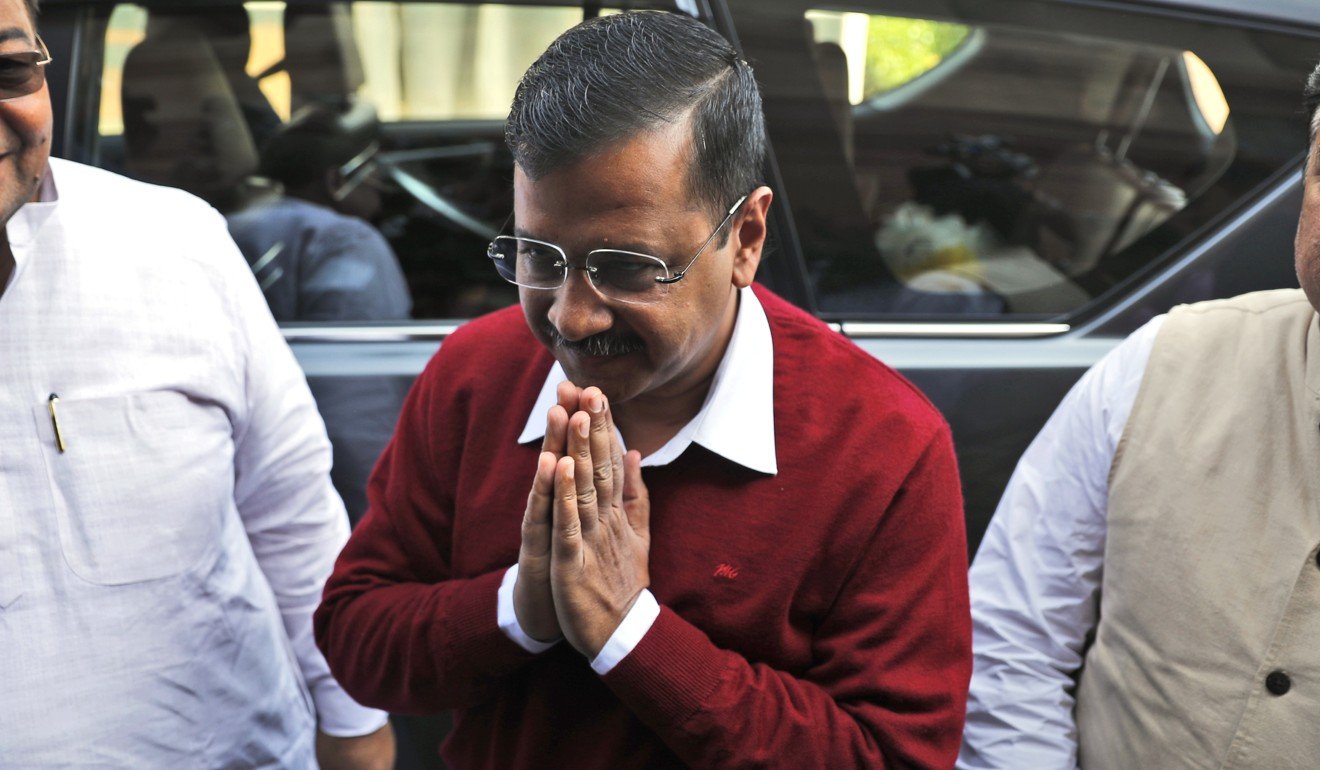
The AAP’s inaction mirrors that of India’s very own Grand Old Party, Congress. It has struggled to keep its flock together ever since it was ousted from power by Modi in 2014 and is still in the throes of a leadership crisis. None of the Congress bigwigs could be found anywhere near the riot-affected areas. It convened a meeting of top leaders while the violence raged but all that the party which led India’s independence movement could muster was a demand for the resignation of the federal home minister and a minute’s silence in memory of the riot victims.
When the partitioning of the subcontinent into Hindu-majority India and Muslim-majority Pakistan triggered widespread riots at the time of India’s independence in 1947, Mahatma Gandhi, Congress’ guiding light, stayed put in Calcutta restoring peace. In early 1948, when communal violence again gripped Delhi, Jawaharlal Nehru rushed to the scene and urged the rioters to stop. The startled rioters, recognising India’s first prime minister, retreated.
India’s current prime minister was hosting Trump at a gala dinner less than 10km from where violence erupted. Even if Modi was not otherwise engaged, nobody would expect him to intervene personally to stop the riots. His detractors hold him responsible for allowing 2002’s violence in Gujarat – where he was then the chief minister – in which more than 1,000 people, mostly Muslims, were butchered. His Hindu supremacist followers admire him for much the same reason. He has a reputation, and a constituency, to protect. What is the excuse of those who claim to oppose Modi’s ideology and swear by Gandhi and Nehru?
Modi’s surgical strike on Muslims puts India at war with itself
The Delhi riots are but one of the many instances of the failure of Modi’s so-called secular rivals to put up a coherent and spirited counter to his Hindu-centric politics at the national level. Even though they have had some success in state elections, national parties like Congress have been in disarray ever since Modi rose to power. But their real crisis is more convictional than organisational. While the BJP sees Modi’s thumping re-election in last year’s national elections as the stamp of popular consent on the party’s majoritarian project of remaking India as a Hindu state, it seems many opposition leaders may have come around to a similar view as well.
They make pious noises about constitutional secularism but lack the moral courage to act on it. They do not threaten Muslims with hate speeches, but do not openly fight their corner either. Most of their activity is on Twitter, which only 1.7 per cent of India’s population uses. They prefer the comfort of tapping on a keypad rather than the rigour of pounding the pavement. As a result, hardline Hindu nationalists have come to dominate India’s political debate. Theirs may be a toxic message of hatred, but the message is loud, unambiguous and sincere.
In an odd way, the BJP has actually been more honest in its hatred of Muslims than the “secular” parties that cynically use the community to garner votes.
The protests against the citizenship law are the first time in six years of Modi’s rule that a sincere alternative idea of India – one closer to the way the country’s founding leaders had envisioned it – has tried to assert itself again. This is what makes these protests so dangerous for Modi, and why he thinks it so important to stub them out. It is no coincidence that these protests are not led by any political party. The BJP claims they are engineered by the opposition, but even it knows that this is a spontaneous, leaderless movement. If the supine opposition could organise something of this scale, they would not be in opposition. In failing to politically mobilise a challenge to the citizenship law, the opposition parties have left Muslims to fend for themselves, and allowed the BJP to portray the protests as a form of Muslim resistance when they are, in fact, a battle for national identity.
Hong Kong is in India, Kashmir is in China. Right?
Modi’s rule is increasingly being compared to the 18-month “Emergency” that former prime minister Indira Gandhi imposed between 1975 and 1977, when she suspended civil liberties. There is a similarly pervasive climate of fear today. Criticism is ruthlessly punished under the current regime, often by branding the critic as unpatriotic. Policing agencies are let loose on political rivals. In Kashmir, the government locked up elected leaders and thousands of others in August without any explanation and threw away the key.
Kashmir, the citizenship law and a citizenship verification drive in Assam have caused India’s score to fall the most among the world’s 25 largest democracies this year, according to a new report from US democracy watchdog Freedom House. Among the countries categorised as “Free”, only Tunisia received a lower score than India. “The Indian government’s alarming departures from democratic norms under Prime Minister Narendra Modi’s BJP could blur the values-based distinction between Beijing and New Delhi,” the report said, equating India’s treatment of its Muslim population with that of China. The world’s biggest democracy now scores 37 in civil liberties, compared with 39 in Hong Kong, where protests demanding democracy have been raging for months.
Conventionally independent institutions key to a democracy, such as the central bank, the military, the media, and even the judiciary, have been witnessing creeping authoritarian control. Justice Murlidhar, who convened the midnight hearing to ensure the safety of riot victims and criticised the Delhi police for not prosecuting BJP leaders’ hate speech, was quickly moved to another court.
To the list of damaged institutions in Modi’s India, add the opposition. Preserving democracy is after all not solely the ruler’s responsibility. The “Emergency” could not rein in the opposition leaders of the day, many of them from the BJP. They were thrown into jail, yet fought back and unseated Indira Gandhi, helping India to turn the page on its darkest chapter after independence. Checking the excesses of power is why the opposition exists. If Modi is wrecking India’s democracy, the opposition’s failure to even put up a fight renders it equally guilty.
While campaigning in London recently for incarcerated WikiLeaks founder Julian Assange, Pink Floyd’s Roger Waters voiced his protest against “Modi’s fascist, racist citizenship law” with lines from a poem by Delhi poet-activist Aamir Aziz, titled Everything Will Be Remembered . A stirring piece of resistance poetry, it speaks of the power of undying dissent and moral courage. It warns those who rule that none of their treacherous injustices will be forgotten.
The cowardly indifference and betrayal of those whose job it is to keep the rulers in line will also be accounted for when their cruelty is recorded. ■
Debasish Roy Chowdhury is a Senior Research Fellow at the Sydney Democracy Network, The University of Sydney

